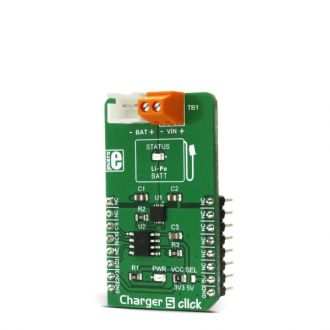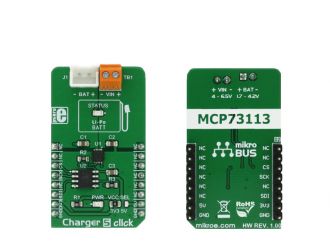
We strongly encourage users to use Package manager for sharing their code on Libstock website, because it boosts your efficiency and leaves the end user with no room for error. [more info]

Rating:
Author: MIKROE
Last Updated: 2018-03-13
Package Version: 1.0.0.0
mikroSDK Library: 1.0.0.0
Category: Battery Charger
Downloaded: 6228 times
Not followed.
License: MIT license
Charger 5 click carries the MCP73113, a single-cell Li-Po/Li-ion battery charge IC from Microchip, along with the digital potentiometer chip labeled as MCP4161, from the same company. This click can be used to easily and securely charge and fast-charge batteries on many different devices that use 3.7V Li-Po/Li-Ion batteries.
Do you want to subscribe in order to receive notifications regarding "Charger 5 click" changes.
Do you want to unsubscribe in order to stop receiving notifications regarding "Charger 5 click" changes.
Do you want to report abuse regarding "Charger 5 click".


Library description
Key functions:
uint8_t charger5_writeReg(uint8_t register_address, uint16_t transfer_data)- Function writes to the click's registers
uint16_t charger5_readReg(uint8_t register_address)- Function reads from click's registers
uint8_t charger5_incrementWiper(uint8_t register_address, uint8_t numberOfSteps)- Function increments value of the click's registers
uint8_t charger5_decrementWiper(uint8_t register_address, uint8_t numberOfSteps)- Function decrements value of the click's registers
uint8_t charger5_setCurrent(uint8_t register_address, uint16_t transfer_data)- Function sets current value of the selected wiper to both, volatile and not volatile, memory locations
Example description
applicationTask()
{
mikrobus_logWrite( "Setting value of current to 500mA", _LOG_LINE );
charger5_setCurrent(_CHARGER5_WIPER0_VOL, _CHARGER5_500MA_CURRENT);
Delay_ms(2000);
mikrobus_logWrite( "Decrementing value of wiper by 5 steps", _LOG_LINE );
charger5_decrementWiper(_CHARGER5_WIPER0_VOL, _CHARGER5_5_STEPS);
Delay_ms(2000);
mikrobus_logWrite( "Incrementing value of wiper by 2 steps", _LOG_LINE );
charger5_incrementWiper(_CHARGER5_WIPER0_VOL, _CHARGER5_2_STEPS);
}
Additional notes and information
Depending on the development board you are using, you may need USB UART click, USB UART 2 clickor RS232 click to connect to your PC, for development systems with no UART to USB interface available on the board. The terminal available in all MikroElektronika compilers, or any other terminal application of your choice, can be used to read the message.